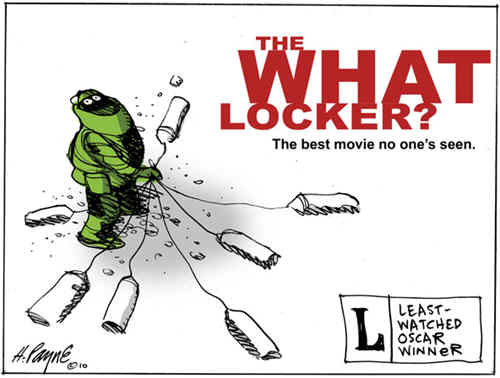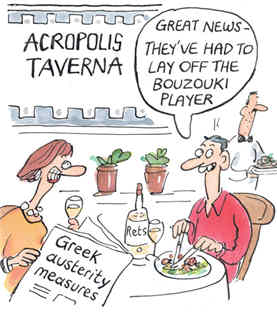Stocks Unhappy Anniversary
Stock-Markets / Stock Markets 2010 Mar 09, 2010 - 12:51 PM GMTBy: PaddyPowerTrader
 Today marks the one-year anniversary of what proved to be the low-point for risk assets in the post Lehman Brothers meltdown. However, as is typical in the wake of a US non-farm payrolls report, markets were pretty subdued overnight. Whilst Asian bourses rallied strongly yesterday in catch-up to Friday’s US price action, most key bourses in Europe have closed virtually unchanged Monday as did those in North America (indeed the S&P 500 traded within just a 4 index point range).
Today marks the one-year anniversary of what proved to be the low-point for risk assets in the post Lehman Brothers meltdown. However, as is typical in the wake of a US non-farm payrolls report, markets were pretty subdued overnight. Whilst Asian bourses rallied strongly yesterday in catch-up to Friday’s US price action, most key bourses in Europe have closed virtually unchanged Monday as did those in North America (indeed the S&P 500 traded within just a 4 index point range).
But sentiment was further helped by a further easing of concerns about Greece. French President Sarkozy made clear that markets should not doubt that Greece could count on the support of France if needed. And overnight, the proposal to create a European Monetary Fund seems to be gaining more traction with German Chancellor Merkel describing the idea as “a good one” (albeit one that will require a change in the EU Treaty). Greek 2-year bond yields fell another 15bps overnight to 4.62% – a 180bps decline over the past two weeks, but still 320bps higher than in early November.
Today Europe made a weak attempt at holding on to last night’s close but we soon drifted off. It’s more of this flip flop risk on risk off rollercoaster. The dynamics have changed today. Previously inline earnings was seen as a positive surprise since expectations were so low. Inline isn’t enough now in Europe, and Deutsche Post (see below) is the classic example. The stock is down 2% after reporting solid numbers this year, with no change to the dividend. Guidance was very conservative but this is historically the case for management.

Today’s Market Moving Stories
•Crude oil fell this morning as crude failed to keep up the strength that brought it to an eight-week high yesterday. Crude prices were pressured downwards by expectations that the EIA will announce another build in crude inventories tomorrow, as well as a strengthening in the USD, as indicated by the Dollar Index index, which is currently at 80.741. The market anticipates a 1.9 million barrel build in US crude inventories last week and a 0.3 million barrel build in gasoline stocks.
•European Commission spokesman Amadeu Altafaj Tardio said that the commission is talking to EU member states in an effort to produce a proposal for a European Monetary Fund. He says that the ideas will be put forward by midyear. A spokesman for French Finance Minister Christine Lagarde said that “it’s an interesting idea… But we’ll need to see how it articulates with other proposals.” The FT says that French officials have welcomed the proposal in principle, but have warned it will probably require an overhaul of existing treaties, for which there is no desire in Paris.
•ECB executive committee member Jürgen Stark said that such a fund would send the “wrong incentives” and would likely result in costly financial transfers across the Eurozone. He stated that “instead of a European monetary fund, budget rules must be strengthened and strictly enforced through a stringent surveillance mechanism.”
•The ratings agencies have been vocal during the European session with Portugal being singled out on the progress it is making on fiscal adjustment. EUR has consequently also come under pressure with Fitch asserting that it is possible to have a sovereign default in the Euro area.
•According to reports out of Portugal, the Portuguese government could consider selling stakes in EDP, as well as other partially state owned enterprises like Galp Energia, and REN in order to support Portugal’s public finances. Portugal owns 20.5% of EDP directly, and another 5.23% via state owned bank CGD, and in theory a sell down could result in a 1 notch downgrade to Baa1 from Moody’s as their rating includes a one notch uplift due to the link with the Portuguese government (the S&P A- rating is a standalone rating, despite “moderate” state support and the “limited link” between EDP and the government).
•Chinese Director of the State Administration of Foreign Exchange (SAFE), Yi Gang, said that Chinese investments in US Treasuries are “market investment behaviour.” He added that “we do not want to politicise [these investments] .We are a responsible investor and in the process of these investments we can definitely achieve a mutually beneficial result.” He also said that SAFE has built a “moderately diversified currency structure including the USD, EUR, JPY etc.” He noted that China will be “cautious” about adding more gold to its foreign exchange reserves and that it will never become a big part of its overall portfolio.
•Morgan Stanley has released a research report that details the current state of our global economy. Included are the 15 must-see charts that explain the global economy.
More Trouble Ahead For Sterling
The Royal Institution of Chartered Surveyors said its monthly house price balance for February dropped to +17 downwardly revised +31 in January. This was the sharpest one-month fall in the balance since April 2008. Prices fell in Wales, northern England, Yorkshire and Humberside and the West Midlands, but continued to rise sharply in London, southern and eastern England and in Scotland.
The British Retail Consortium said that the value of retail sales in February rose 2.2% YoY on a like-for-like basis (compared to a 0.7% decline in January). BRC director-general Stephen Robertson said that “despite appearances, these results are not that strong. The growth is compared with very weak figures a year ago — when February saw the worst of last winter’s weather — and this February’s performance was helped by sales postponed from January.”
 A survey carried out by Populus on behalf of The Times shows that the switch of voters from Labour to the Tories is about 1.5 to 2 points higher in the 100 battleground seats than nationally. The paper says that while this might be worth an extra 20 MPs to the Conservatives, it is smaller than many in the party would hope. It also says that this might only be enough to take the Tories to the threshold of the 326 seats they need for a bare overall majority in the Commons.
A survey carried out by Populus on behalf of The Times shows that the switch of voters from Labour to the Tories is about 1.5 to 2 points higher in the 100 battleground seats than nationally. The paper says that while this might be worth an extra 20 MPs to the Conservatives, it is smaller than many in the party would hope. It also says that this might only be enough to take the Tories to the threshold of the 326 seats they need for a bare overall majority in the Commons.
Moody’s Investors Service says that the wind-down of the banking bailout programs could trigger ratings downgrades of some British lenders’ bonds.
PricewaterhouseCoopers estimates UK government borrowing will be around 5% of gross domestic product in 2014-15 (compared to the Treasury’s forecast of 4.4%). PwC says that the fiscal gap could be closed through many possible combinations of tax rises and spending cuts starting from 2011-12 and building up to around £20bn a year by 2013-14.
February’s UK trade figures suggest that the much needed pick-up in the external sector is still not in evidence. If anything, things are getting worse. The trade in goods deficit widened from £7bn in January to £8bn, while the overall trade deficit grew from £2.6bn to £3.8bn. Excluding oil and erratics, the picture wasn’t much better. What’s more, this deterioration was driven by a sharp drop in exports, rather than a jump in imports. Total export volumes posted an 8% monthly fall, compared to a 2.3% fall in imports. There is clearly a big question mark over whether any improvement in net trade will come through quickly or strongly enough to offset the weakness in domestic demand.
All of the above combined with comments from the Fitch ratings agency which stated that UK fiscal adjustment was proceeding at a pedestrian pace have put Sterling on the back foot yet again today.
Company News
•On Jan 1st 2009 Aer Lingus had net cash of €653m. Twelve short months later that cushion has been squeezed to €335m as operating losses of €81m hit the company with both short haul (-12%) and long haul (-15.9%) fares falling while passenger volume grew 3.8% (to 10.4m). It is that cash reserve that keeps Aer Lingus from a far more precarious financial position. Without it the decision by the IMPACT union to reject restructuring proposals would trigger investor and banking alarm bells.
•Cisco rather cryptically announced that later today they will make an announcement that will “forever change the Internet and its impact on consumers, businesses and governments” – we await for their words of wisdom!
•International Power reported strong full year 2009 results with operating profit up 10% to £1,157m, ahead of consensus of £1,139m. Cash flow performance was strong with free cashflow up 54% to £791m, as a result of the stronger operating result and working capital improvements, and combined with the £638m disposal proceeds, net debt fell from £6,318m to £5,059m. The outlook is vague, but upbeat, and the company will continue to pursue growth opportunities, although with a focus of free cash flow generation as well.
•Deutsche Post full year EBIT came in at €1.47bn (down 27% on 2008), ahead of the €1.35bn guidance but a miss on expectations for Q4. The result was driven by cost savings – €1.1bn achieved from the IndEx programme launched in late 2008 – given that revenue fell by 11.4% during 2009 (albeit revenues rose in Q4).
•Sanofi Aventis has this morning confirmed that it is to exercise its option to combine Merial, the Group’s animal health business, with Merck’s Intervet/Schering-Plough business to create a global leader in the sector. Elsewhere, there were rumours in the equity market yesterday that Sanofi could be considering launching a $74/share offer for Biogen Idec in what would amount to a $20bn deal. Rumours regarding Sanofi Aventis as a would-be acquirer are not new, but a deal of this size would clearly be stretching in the context that management have previously flagged their intention to pursue medium sized bolt on acquisitions.
•EADS results released this morning came in slightly better than expected at the underlying operating profit level, but the high level of provisions and adverse fx movements meant that the Group reported a full year net loss of €763m.
The operating loss came in at €322m largely as a result of the additional provisions booked on A400M (€1.8bn) and A380 (€240m). As a result, management have recommended the dividend be scrapped for the first time in the Group’s history, although this should not come as a surprise given the quantum of losses and the fact that A400M customers would not have looked upon a distribution favourably.
And Finally… You Don’t Mind Being In Debt For 30 Years
Disclosures = None
By The Mole
PaddyPowerTrader.com
The Mole is a man in the know. I don’t trade for a living, but instead work for a well-known Irish institution, heading a desk that regularly trades over €100 million a day. I aim to provide top quality, up-to-date and relevant market news and data, so that traders can make more informed decisions”.© 2010 Copyright PaddyPowerTrader - All Rights Reserved
Disclaimer: The above is a matter of opinion provided for general information purposes only and is not intended as investment advice. Information and analysis above are derived from sources and utilising methods believed to be reliable, but we cannot accept responsibility for any losses you may incur as a result of this analysis. Individuals should consult with their personal financial advisors.
PaddyPowerTrader Archive |
© 2005-2022 http://www.MarketOracle.co.uk - The Market Oracle is a FREE Daily Financial Markets Analysis & Forecasting online publication.




